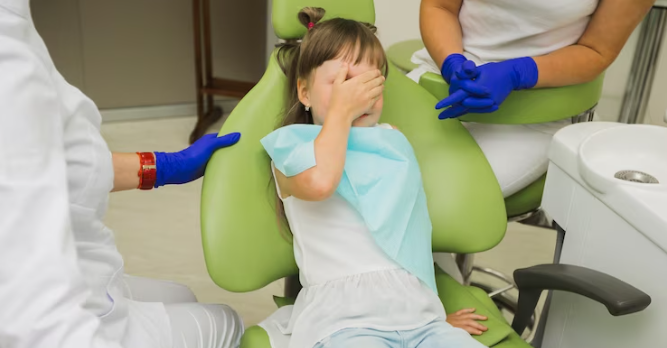Gum Disease Treatment
Gum disease is characterized by lasting inflammation of the gum tissue that can progress to destroy the supportive bone structure around the teeth. It is also called periodontal disease and is caused by the accumulation of dental plaque, a sticky film of bacteria that continuously forms on our teeth.
If not removed regularly through brushing and flossing, plaque can harden into tartar (calculus), which provides an even greater refuge for bacterial growth and can contribute to further destruction of gum tissue and bone. The earliest stage you may encounter when it comes to gum disease is gingivitis. It is characterized by redness, swelling, and bleeding gums. Gingivitis can become periodontitis if left untreated, which destroys the gum tissue and the bone that supports your teeth. It is the very common cause of tooth loss and missing teeth, especially for adults.
Gum disease is usually caused by plaque, a sticky film of bacteria that constantly forms on our teeth. Plaque is usually composed of food debris, saliva, and millions of bacteria. The bacteria in plaque produce toxins which then damage the gums and bones around the teeth. Poor oral hygiene is the primary cause of gum disease. Brushing and flossing your teeth regularly can help prevent gum disease.
Other causes include smoking, diabetes, certain medications, genetics, and a family history of gum disease. Gum disease, if caught early, can be treated with professional cleaning and improved at-home care. More advanced cases may require surgery to restore damaged tissue. However, it is preventable with good oral care habits. If you have gum disease, you must see a dentist or periodontist regularly. They will clean your teeth and gums and check for any further damage. Early detection and periodontal treatment Tooele UT can help prevent gum disease progression and improve oral health.
Gum Disease Treatment & Gingivitis Dental Treatment
Gingivitis is a common problem and can cause tooth decay and other dental problems if not treated. There are many different gingivitis dental treatments, but the most important thing is to see your dentist for diagnosis and treatment. Some common periodontal treatments include mouthwash, antibiotics, scaling, and even root canal planing (deep teeth cleaning). In some cases, periodontal surgery may be advised. Our dentist at Gentle Touch Family Dentistry will recommend the best treatment and dental procedures based on your situation. Follow their instructions carefully to clear the infection and protect your teeth from further damage.
Signs & Symptoms
Do I have Gum Disease?
Think you might have gum disease? If so, you’re not alone. However, many people are amazed to learn that gum disease is actually quite common, affecting an estimated 64.7 million Americans, according to the Centers for Disease Control and Prevention (CDC). Fortunately for patients, several warning signs can help you determine if you have gum disease and whether or not you need to see a dentist. If you notice any of these signs, it’s essential to see a dentist as soon as possible. Early recognition and treatment are vital to avoiding the progression of gum disease.
The Best Dental Services In The Tooele Area
Contact us to schedule an appointment or visit our website and start not only your family and but your children’s and family’s journey to a brighter smile in Tooele, Utah!
We are proud to provide high-quality dental care to patients with a full smile and gentle touch. Our very friendly staff and experienced team of dentists and hygienists offer complete preventive, cosmetic, and restorative dental services in one convenient location to treat patients in Tooele and the surrounding communities.
We are on Top Because of Our Training
At Gentle Touch Family Dentistry, our dental training program is designed to provide exceptional education and hands-on experience to our aspiring dental professionals. With a commitment to excellence and a focus on compassionate care, we strive to equip our trainees with the skills and knowledge necessary to deliver the highest standard of dental services.
Our comprehensive training curriculum covers a wide range of dental procedures, including preventive care, restorative treatments, orthodontics, and oral surgery. Under the guidance of our experienced dental team, trainees gain invaluable practical experience through supervised patient interactions, allowing them to develop their clinical skills and bedside manner.
We believe in fostering a supportive learning environment where trainees can thrive and grow. Our dedicated instructors are passionate about mentoring and guiding each individual towards their personal and professional goals. We emphasize continuous learning and encourage trainees to stay updated with the latest advancements in dental technology and techniques.
By choosing Gentle Touch Family Dentistry for your dental training, you can embark on a fulfilling journey towards becoming a confident and compassionate dental professional, dedicated to providing gentle and exceptional dental care to patients of all ages.
What Type of Treatment is Right For Me?
Do I need Gum Disease Treatment?
Gum disease is a serious condition that can lead to tooth loss and other health problems. If you have gum disease, periodontal treatment can help keep your teeth and gums healthy. Treatment for gum disease can include scaling and root canal planing (deep cleaning of your teeth), antibiotics, surgery, or a combination of these methods. The type of treatment will depend on the harshness of your gum disease. Scaling and root canal planing may be all you need if you have mild gum disease. This involves removing plaque and tartar from your teeth and smoothing out the roots to help remove bacteria. Surgery may be needed for more severe cases of gum disease to restore your gums’ health. Surgery can involve flap surgery, bone grafts, or tissue regeneration.
After your treatment is complete, it is important to practice good oral hygiene habits and visit your dentist regularly to help prevent gum disease from recurring. Good oral hygiene habits and regular professional dental cleanings can help prevent gum disease. Brush your teeth twice a day and floss daily. See your dentist regularly for checkups and cleanings. Talk to our dentist if you have any concerns about your oral health. Early diagnosis and periodontal treatment can help keep your smile healthy for a lifetime.
How Does Gum Disease Happen?
Gum disease starts with plaque. If plaque isn’t removed, it can harden and turn into tartar. Tartar promotes gum inflammation and can lead to Gingivitis, or early gum disease. Gingivitis causes redness, swelling, and bleeding gums. At this early stage, gum disease is still reversible. However, timely professional cleaning and good oral hygiene at home can help eliminate the problem.
If Gingivitis is not treated, it can advance to periodontitis or advanced gum disease. This serious condition can damage the tissues and bones that support your teeth. Periodontitis requires professional treatment to be reversed. In severe cases, teeth may need to be removed.
Prevention of Gum Disease
According to the American Dental Association, there are many steps you can take to prevent gum disease and maintain good oral health. These include:
Hence, gum disease is a serious dental problem that can lead to tooth loss and other complications if left untreated. By knowing the signs and symptoms, causes, treatment, and prevention techniques, you can take steps to protect your oral health and prevent gum disease from developing or worsening. So, make sure to practice good oral hygiene habits, maintain a healthy lifestyle, and visit your dentist regularly for check-ups and cleanings to keep your gums and teeth healthy.
Early gum disease (called gingivitis) occurs when the gums are red, puffy and bleed easily, and often causes bad breath. More severe gum disease (called periodontal disease) also may have signs including looseness of teeth, heavy plaque and tartar, deep gum pockets and bone loss. All forms of gum disease pose risks to the health of your mouth, and also your overall body health, especially the cardiovascular system.
Periodontal treatment is crucial. It helps to protect your teeth from periodontitis.
Periodontal therapy involves a variety of treatments, such as scaling and root planing, periodontal surgery, and laser therapy. These treatments can effectively remove plaque and bacteria from your teeth and gums, reduce inflammation and infection, and promote healing. The first phase of periodontology scaling and root planing is cleaning the root surfaces to remove dirt. Moreover, the smoothing of the root surface prevents recurring buildup and allows for the repositioning of the gingiva (gum tissue).
What Patients Can Expect
Our specialized endodontic procedures are renowned for the highest quality and the highest standards for quality and a complete range of services to our patients. Our patients are able to enjoy a high quality of life with unparalleled quality.
Tooele’s Periodontal Specialized Services
If you’re in need of specialized periodontal services, Tooele has it all. Our extensive range of personalized services cater to a wide variety of needs, offering everything from basic preventive care to advanced surgical interventions. Our team of experienced periodontal specialists is dedicated to providing personalized, high-quality, and comprehensive dental care that addresses your unique needs and concerns.
We Offer Comfortable and Affordable Dental Visits!
At our dental practice, we strive to provide our patients with the most comfortable and stress-free visits possible. Our friendly and accommodating staff will make sure you feel welcome from the moment you walk in the door. We also understand the importance of affordability when it comes to dental care, so we offer a variety of payment options and accept most insurance plans. Whether you need a routine cleaning or a more complex procedure, we are here to help you maintain a healthy and happy smile. Come visit us today and see why our patients love us!
Same-Day Services
If you are experiencing periodontal issues such as gum disease or tooth decay, it is important to seek treatment as soon as possible to prevent further complications. Our dental office offers same-day periodontal services to help address these issues in a timely and convenient manner.
Our experienced team of periodontists can quickly assess your condition and recommend the best course of treatment for you. We use the latest technology and techniques to ensure safe, effective, and minimally invasive treatment for our patients.
Our Priority Is Your Dental Care
Gentle Touch Family Dentistry offers a convenient solution to your dental concerns. Our expert dental team is focused on offering individualized care to meet your individual needs. Our services range from teeth cleanings, dental crown and bridge restorations to dental implants and more. Our dental experts have the latest technology to ensure you get maximum results when using teeth whitening treatments. All services are personalized with maximum professionalism.
Our Thriving Dental Practice
At Gentle Touch Family Dentistry, we believe in personalized services tailored to meet each patient’s unique needs. Whether you require routine cleanings or complex dental procedures, such as root canals, our team of skilled professionals is here to ensure your dental health is our top priority.
We are proud to announce the addition of a new dentist to our team who brings fresh perspectives and expertise to our practice. On your first visit, our friendly staff will make you feel comfortable and guide you through the process, explaining each step along the way. We understand that visiting the dentist can be an anxious experience for some, and we are committed to creating a relaxed feel comfortable, and soothing environment for all our patients.
With the support of the latest research and technologies, we strive to offer the highest quality dental care. Our commitment to staying up-to-date with the very latest research and advancements in cosmetic dentistry and laser dentistry allows us to provide efficient and effective treatments. Furthermore, we understand the value of a second opinion, and our team is always ready to address any concerns or questions about dentistry you may have.
Call Today To Schedule An Appointment!
All our patients are treated in a friendly and professional environment. We are going to meet your needs – it’s all about maintenance and emergency dentistry. At our dentist office, we provide comprehensive treatment options to our patients.




